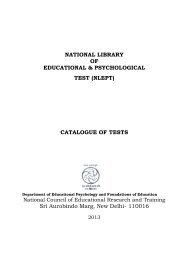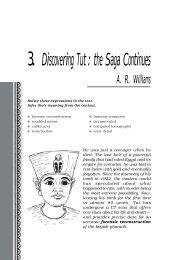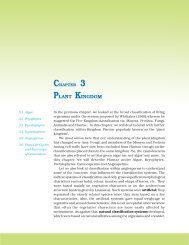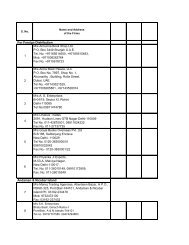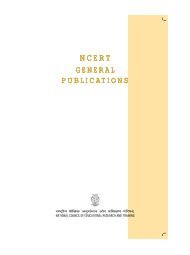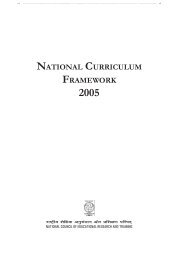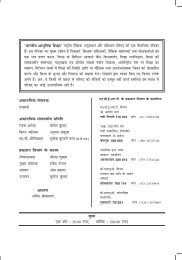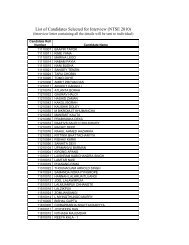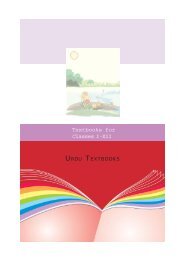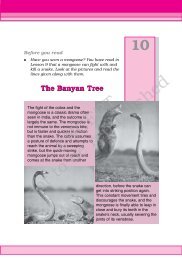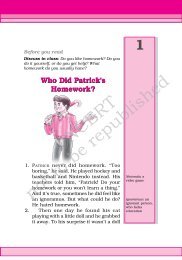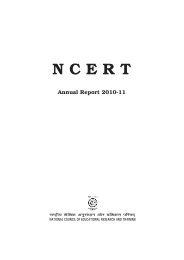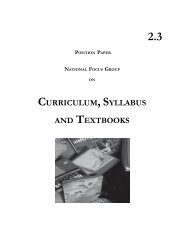indian education - National Council Of Educational Research And ...
indian education - National Council Of Educational Research And ...
indian education - National Council Of Educational Research And ...
Create successful ePaper yourself
Turn your PDF publications into a flip-book with our unique Google optimized e-Paper software.
26 Journal of Indian Education August 2007<br />
integrating their experiences with school<br />
knowledge rather than their ability to<br />
reproduce external knowledge (p.13)”. It<br />
motivates schools to “provide<br />
opportunities to students to question,<br />
enquire, debate, reflect and arrive at<br />
concepts to create new ideas (p.18)”.<br />
These are the important steps of value<br />
clarification and conflict resolution<br />
process also, which help in removing<br />
apprehensions, mistrust and doubts<br />
about others and encourages living<br />
together. Active listening, critical<br />
thinking, problem-solving and conflict<br />
resolution are the skills emphasised in<br />
the context of <strong>education</strong> for peace, which<br />
are also the thrust of constructivist way<br />
of learning and promoted in NCF – 2005.<br />
It strongly feels that “schools must be<br />
marked by the values of equality, social<br />
justice and respect for diversity, as well<br />
as of the dignity and rights of children”<br />
(p.81).<br />
Expressing concern over the neglect<br />
of child’s local context in the present<br />
school practices the NCF (2005)<br />
recommends “we emphasise the<br />
significance of conceptualising <strong>education</strong><br />
or situating learning in the child’s world,<br />
and of making the boundary between the<br />
school and its natural and social<br />
environment porous. This is not only<br />
because the local environment and child’s<br />
own experiences are the best entry points<br />
into the study of disciplines of knowledge,<br />
but more so because the aim of knowledge<br />
is to connect with the world” (p.30).<br />
A central strategy for constructivism<br />
is the creation and encouragement of<br />
collaborative learning environment,<br />
which provides opportunities to learner<br />
to develop, share, compare and<br />
understand multiple perspectives of an<br />
issue. Conscious efforts are made by the<br />
teacher under constructivist approach<br />
to cultivate non-threatening learning<br />
environment (Watt and Bentley, 1987)<br />
that facilitates students’ knowledge<br />
construction process. Teachers in this<br />
situation are required to display respect<br />
and care for students’ learning and<br />
students knowledge construction process<br />
is facilitated by encouraging them to<br />
discuss, explain and evaluate their ideas<br />
and procedures. The NCF – 2005 provides<br />
opportunities for such learning<br />
experiences to learners – right from the<br />
pre-primary stage to higher secondary<br />
stage. It lays stress on problem-solving,<br />
dramatisation and role-play, etc, which<br />
remain under explored strategies of<br />
teaching in the present system. It<br />
recommends “in order making the process<br />
of learning participative, there is a need to<br />
shift from mere imparting of information to<br />
debate and discussion. This approach to<br />
learning will keep both the learner and the<br />
teacher alive to social realities” (p. 54).<br />
Triangular Relationship between<br />
NCF – 2005, Constructivism and<br />
Pedagogy of Peace Education<br />
Education for peace is fundamentally<br />
dynamic, interdisciplinary, and<br />
multicultural in nature and aims at<br />
developing knowledge, skills and<br />
attitudes needed to achieve and sustain<br />
global culture of peace. Promoting the<br />
culture of peace calls for developing<br />
skills among learners for active listening,<br />
problem-solving, and conflict resolution.<br />
These skills need to be developed early<br />
in learners and nurtured continuously.<br />
The personal experiences of learners,<br />
therefore, have to be honoured and<br />
treated as a base for dialogue and new



